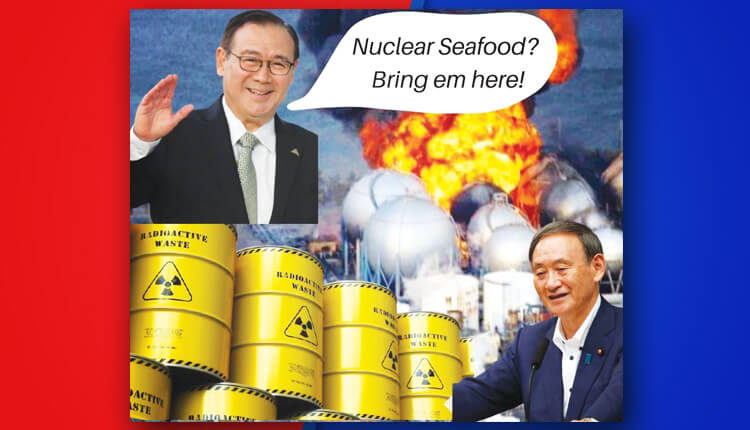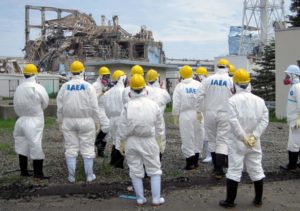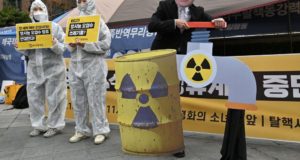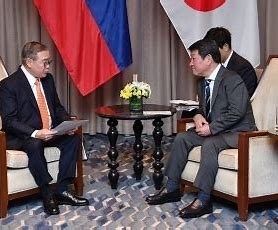Japan to dump nuke waste; is PH lifting of ban on Fukushima products wise?
US supports Japan but still bans imports from Fukushima region

DESPITE domestic and global opposition, especially from the so-called ‘Pacific States,’ Japan announced last April 13, 2021, that it would be dumping, starting on 2023, 1.2 million tons of nuclear wastewater into the Pacific Ocean that have accumulated after its nuclear plant in Fukushima region broke down due to a powerful earthquake in 2011.
The Philippine News Agency (PNA), in a news dispatch, said the announcement was made by Japanese Prime Minister Yoshihide Suga, who also said the decision was arrived at “after convening a meeting of relevant ministers to formalize plans to release the radioactive water accumulated at the plant into the Pacific Ocean.”
Struck by a magnitude-9.0 earthquake and the ensuing tsunami that hit Japan’s northeast on March 11, 2011, the No. 1-3 reactors at the Fukushima Daiichi nuclear plant suffered core meltdowns.
The plant has been generating massive amount of radiation-tainted water since the accident happened as it needs water to cool the reactors.
The plant’s operator, Tokyo Electric Power Company Holdings Inc. (TEPCO), said it will take around two years for the release to start.
The water has been treated using an ‘advanced liquid processing system’ (ALPS), to remove most contaminants. However, things like tritium, a radioactive byproduct of nuclear reactors, are hard to filter out.
Japan finds comfort over the fact that the United States, the country that bombed Japan with two atomic weapons in 1945, had supported its decision to pollute the entire Pacific Ocean with radioactive waste.
According to some marine experts, traces of ruthenium, cobalt, strontium, and plutonium isotopes in the wastewater also raise concerns.

Leading the countries opposed to Japan’s decision are China and South Korea, which have registered their strong opposition.
China expressed its grave concerns through diplomatic channels, with Foreign Ministry spokesperson Zhao Lijian urging the Japanese side to take a responsible attitude and treat the issue of nuclear waste disposal with caution.
Zhao stressed that proper disposal of nuclear waste is related to international public interests and the vital interests of neighboring countries. It should be handled carefully and properly to avoid further damaging the marine environment, food safety and human health.
South Korea, for its part, also voiced “grave concerns,” with foreign ministry spokesman Choi Young-sam saying, “It will be difficult to accept if the Japanese side decides to release the contaminated water from the Fukushima nuclear power plant without sufficient consultations.”
“Our government expresses grave concerns as the decision can have direct and indirect impact on the safety of our people and the surrounding environment,” he added.
Global, domestic opposition
The PNA further reported that the plan has been facing strong opposition from the Japanese fish industry and the public, with fishery industry representatives saying it would undo years of work to restore their reputation.
“We are dead against a release of contaminated water to the ocean as it could have a catastrophic impact on the future of Japan’s fishing industry,” Hiroshi Kishi, head of the national federation of fisheries cooperatives known as JF Zengyoren, told a meeting with government officials last October 2020, when the proposal to release the contaminated water to the Pacific Ocean was first publicly discussed in Japan.

According to Kishi, the release of radioactive water could trigger other countries to tighten restrictions on imports of Japanese fishery products, reversing a recent trend toward loosening.
Currently, a number of countries and regions continue to impose restrictions on Japanese agricultural and fishery products as a result of the Fukushima crisis amid continued concerns about the safety of the produce.
“It is inevitable that there would be reputational damage regardless of how the water will be disposed of, whether into the sea or into the air,” he said. “I want the government to clarify how it intends to respond to such reputational damage,” Kishi declared.
Japanese Economy, Trade and Industry Minister Hiroshi Kajiyama said last April 8, 2021, that while working on the concerns of the fisheries industry, the government hopes to seek cooperation of the International Atomic Energy Agency (IAEA) and other global organizations, while maintaining transparency over the matter.
The Japanese government had initially hoped to make a decision on the release of the water last October 2020.
However, it delayed the decision due to fierce opposition from local fishermen.
According to a survey conducted by public broadcaster NHK late last year, 51 percent of respondents said they are “against” or “quite against” the idea of discharge the wastewater into the sea, while only 18 percent said they are in favor of the plan.
Another poll conducted by Asahi Shimbun newspaper in January (2021) showed that 55 percent of respondents are against the government’s plan to discharge contaminated radioactive wastewater in Fukushima into the sea, while 32 percent said they support it.
Yukio Edano, the leader of Japan’s main opposition party, the Constitutional Democratic Party of Japan (CDPJ) strongly condemned the plan after the announcement was made on April 13, 2021, saying the government’s decision is unacceptable and a complete disregard for the voices of the people of Fukushima.
Some environmental groups including Friends of the Earth Japan and the Citizens’ Commission on Nuclear Energy said on April 15, 2021, that they have collected more than 64,000 signatures from 88 countries and regions in a petition to the government against the decision to dump Fukushima wastewater into the sea.
However, Japan finds comfort over the fact that the United States, the country that bombed Japan with two atomic weapons in 1945, had supported its decision to pollute the entire Pacific Ocean with radioactive waste.
PH ban lifted not on the basis of science but ‘goodwill’
But while the United States fully backs Japan’s decision, it still however continue to ban the entry of all agricultural and seafood products from the Fukushima region.

The Philippines, on the other hand, despite lacking any sophisticated technology to test the safety of seafood, meat and farm products from Japan, had lifted its ban as early as two years ago, in 2019. The Philippines followed other countries in banning imports from Fukushima and nearby areas after the nuclear disaster there in 2011.
At the time, during the term of agriculture secretary, Emmanuel Piñol, the government agreed to lift the ban on the import of Cherry Salmon, Sand Lance, Japanese Dayu and Ayu coming from Fukushima.
But last January 2020, the country lifted all restrictions, apparently to simply gain the goodwill of Japanese foreign minister Motegi Toshimitsu, who visited the Philippines from January 8 to January 9.
It also appears that for the sake of political goodwill on behalf of the Philippines’ oppressor during World War 2, the ban was lifted regardless of the country’s total inadequacy to test the fitness for human consumption of these products.
“Japan welcomes the lifting of the import ban of food products from Japan by the government of the Philippines yesterday. With this lifting, we hope that safe food from Fukushima as well as other parts of Japan will reach many people in the Philippines,” Motegi said during his press conference with foreign affairs secretary, Teodoro Locsin.
A news article at ‘food navigator asia.com’ on the visit dated February 4, 2020, quoting the Japanese Ministry of Agriculture, Forestry and Fisheries’ Food Industry Affairs Bureau, said the Philippines became the 34th country worldwide and only the 12th country in Asia Pacific to fully lift “all import bans and measures on Japanese foods previously restricted due to nuclear radiation concerns.”


